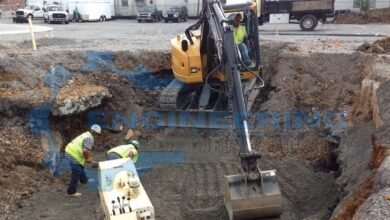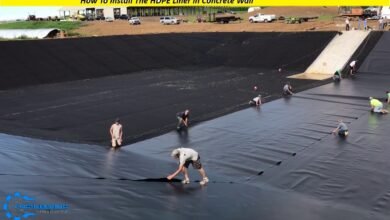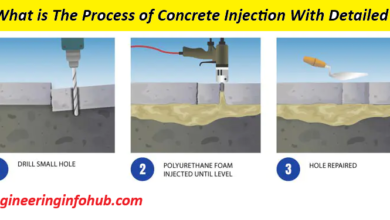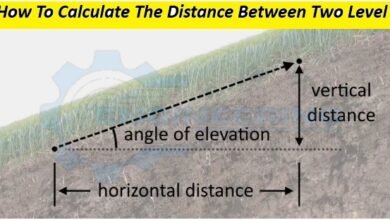Definition |Procedure |Materials And Types of Grouting With Details
Definition of Grouting |Types of The Materials Using For Grouting |Procedure of Grout |Types of Grout For pipe of Ceramic |Properties of Grouting |Basic Types of Grouting |Advantages of the Grouting

Definition |Procedure |Materials And Types of Grouting With Details
grouting Grout is the admixture of beach, cement, and water or chemicals used to fill gaps. Grout is used in repairing concrete cracks, and holes in penstocks, filling seams, gaps for selling and waterproofing feeling, and soil stabilization. Grove is also used to give new strength to the foundation of cargo-bearing structures. Definition |Procedure |Materials And Types of Grouting With Details.
Definition of Grouting
grouting Grout is the admixture of beach, cement, and water or chemicals used to fill gaps. Grout is used in repairing concrete cracks, and holes in penstocks, filling seams, gaps for selling and waterproofing feeling, and soil stabilization. Grove is also used to give new strength to the foundation of cargo-bearing structures. Eventually, the grating is generally the process of edging in humble material into the design to change its physical parcels.
Types of The Materials Using For Grouting
Cement Grouting
Cement grouting is the instruction under grout or cement to fill the fractured or voids in the soil, concrete structure, or gemstone unit.
Chemical Grouting
This type of grouting transforms grainy soils into sandstone- similar to millions by filling the voids with little density,non-particular grout. This type of grout is an injection under pressure through anchorages. And grout permeates the toughened soil, creating sandstone- similar to mass.
Bentonite Grouting
This is a specially formulated sodium bentonite. It’s used for water well grout, drilling hole abandonment, sealing covering well containing, or geothermal grout. Its 2 Types & Advantages.
Basic Types of Grouting
G1 Grouting
This type of grouting is generally for sword structures, small pumps, halls, and non-vibrating ministries. Still, the precise operation of grout type to every position will be according to applicable delineations. The grout will be free-inflow-inflow cementless grout, nonshrinking with small compressive strength at least equal to the concrete foundation, but strength not lower than 30 N/ MM2 in seven days and 40 N/ mm2 in twenty- eight days and will be lower than.
G2 Grouting
G2 grouting shall be used generally in the prefabricated structure of concrete, compressors, and other further heavy outfit subject to vibration and column-bearing plates of rich designs. This type of grout shall be personal non-compressible cement high-strength grout,e.g., FOSROC, S context GP2, Sikka, and MC- bauchemie excrete or likewise and approved by EIC. This grout is a compressive strength of a minimum will be fifty N/ mm2 in seven days, and in 28 days will be 60 N/ mm2.

Properties of Grouting
Well, bond to concrete. Substrate medication suitable adaptation Excellent inflow characteristics No member or bleeding Final strength high Easy to blend; only add water. Non-corrosive Not ignitable Non-toxic Impact and vibration resistant Easy to use loss compensated suitable adaptation institution.
Read More
Calculate The Volume Of The Cement Sand And Aggregate
Introduction Of The Soil And Difference Between Soil And Sand
What Is The Difference B/T Low And Heigh Strength Concrete
Types of Grout For pipe of Ceramic
Without Sand, Grout
Without Sand, Grout grout is used for wall penstocks where the joints are ⅛ elevation to ⅜ elevation wide.
Completed Filed Grout
This is used for penstocks where the joints are ⅛ elevation to ⅜ elevation wide.
Chase Types Grout
is the same as finely filed grout for ceramic penstocks except that the coarsest grade of the beach is used. This type of grout is used for a joint that is ⅜ elevation to ½ elevation wide similar to those used with saltillo penstocks. It’s 2 types & Advantages. Chase-type grout
Epoxy resin grout It consists of epoxy resin and hardened. The epoxy resin grout for ceramic penstocks is mainly resistant to chemicals and stains and has tremendous cling strength.
Procedure of Grout
Choose the grout color. Apply the grout. Hold the grout pier at an angle of 90 degrees. Wipe the pipe with the damp sponger. To remove the haze, use a damp cloth. Apply the sealer Caulk along baseboards and walls.
Grouting Materials
grout is a compound material that consists of cement, beach, and water. It’s used for filling the voids under the machines and other rudiments, sealing the joints and opening in the face, and buttressing being structured.
Cement Grouting
Cement grouting is the instruction under grout or cement to fill the fractured or voids in the soil, concrete structure, or gemstone unit.
Advantages of the Grouting
Grout can be done on any ground condition. Advancements in the ground structure can be measured. It’s salutary for low headroom operations. It can install walls. Grout is useful for limiter space. It has been used for arbor jacking that misshaped foundation. It can control groundwater inflow, seepage, and dangerous waste accouterments process and their types.
Read More
-
Transportation Concrete |Importance Type And Method Of Transportation Concrete
-
Standard Test Of Concrete And Types Of Slump Test
-
Estimate the Concrete Volume for the Staircase
-
Calculate The Concrete For The Trapezoidal Footing
-
Calculate The Estimate Of The Soakage Pit
-
How To Calculate The Estimate of Septic Tank
Thanks For Reading the Article Get More Information And Share it With Others
JOIN US & LIKE MY OFFICIAL FACEBOOK PAGE
THANKS








2 Comments